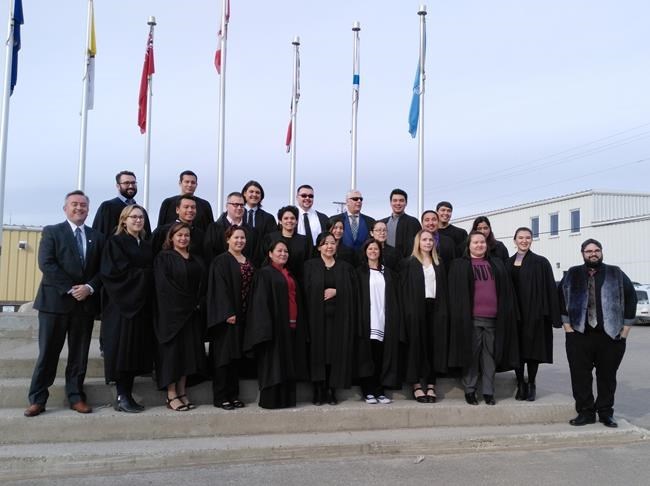IQALUIT — For the first time in more than 15 years, Nunavut has a group of homegrown lawyers.
Last month, 23 students wrote their final exams for the Nunavut law program in the same classroom they spent most of their days in the last four years.
The graduating class of lawyers is the first in Nunavut since 2005. The most recent program, which began in 2017, has been run jointly through the Nunavut Arctic College in Iqaluit and the University of Saskatchewan in Saskatoon.
The program brought Robert Comeau, who was born in Iqaluit, home after he completed a political science degree in Ottawa.
"Law school isn't this unattainable thing. It happened here in Iqaluit. It's not a shot in the dark," Comeau said.
Many of the program's professors flew up from southern Canada to teach, so courses were condensed into three-week intensive modules. Students spent class time packed into what used to be a hotel bar.
"We were like sardines," Comeau said. "It's not like down south where you have 200 people in your class."
Despite the close quarters, Comeau and his classmates became good friends, he said.
"We're family now."
Comeau said students ranged from young people to others with 20 to 30 years of workforce experience. The program had over 80 applicants and accepted 25 students. All but two finished.
'We have younger Inuit, older Inuit, qalunaat (non-Inuit) and a mix of mature students and students coming right out of university."
The first year was dedicated to studying Inuit history and the Nunavut Land Claims Agreement which created the territory.
Comeau said a legal education is a privilege.
"Regardless if you're practising law, or influencing policy or running a business, you are more well-equipped to deal with the problems facing our community," he said.
"I want to take this degree and do the best things I can do with it."
Comeau said he'd like to see more professors from closer to home.
"People want to come teach us. We've had one of the best faculties available to any class of law students," he said.
"But there were concerns throughout the program about why some classes couldn't be taught by local professors."
Emily Karpik, another Nunavut law graduate, grew up in Pangnirtung and used to work as a Crown witness co-ordinator at the public prosecution office in Iqaluit. She said that job made her realize how badly Inuit were needed to work in Nunavut's courts
"I really saw the need for Inuit to take part in ... the court system as lawyers, as judges — Inuit who speak the language especially. I saw a lot of Inuit not understanding this system that is foreign to them."
Karpik, whose first language is Inuktitut, said she wants to bring her mother tongue into the courtroom.
"How can I use the Inuktitut language within the system to help Inuit get a better understanding of the law? It's a struggle, but it's possible."
Sixteen of the program's 23 graduates are Inuit, something Karpik said will make a big difference in a Nunavut's legal landscape, which is dominated by lawyers from southern Canada.
"We understand the dynamics of living in the North. This is who we are. This is how we live. A lot of times I've come to learn and understand that lawyers who come up from the south don't have that understanding," she said.
Another Nunavut law student, Jessica Shabtai, grew up in Toronto and moved to Iqaluit in 2014. She'd like to see a dedicated law program in Nunavut.
"In enough time, I'd love to see some of my classmates teaching this program."
The college hasn't indicated that the degree will be offered again.
Karpik said if it is, she would like to see more focus on the Inuktitut language and Inuit laws.
Comeau, who is Inuk, agrees.
"Sure, we're all getting degrees, but now there's this community of people that are going to actively use this education to make change in Nunavut."
This report by The Canadian Press was first published May 30, 2021.
___
This story was produced with the financial assistance of the Facebook and Canadian Press News Fellowship
Emma Tranter, The Canadian Press



